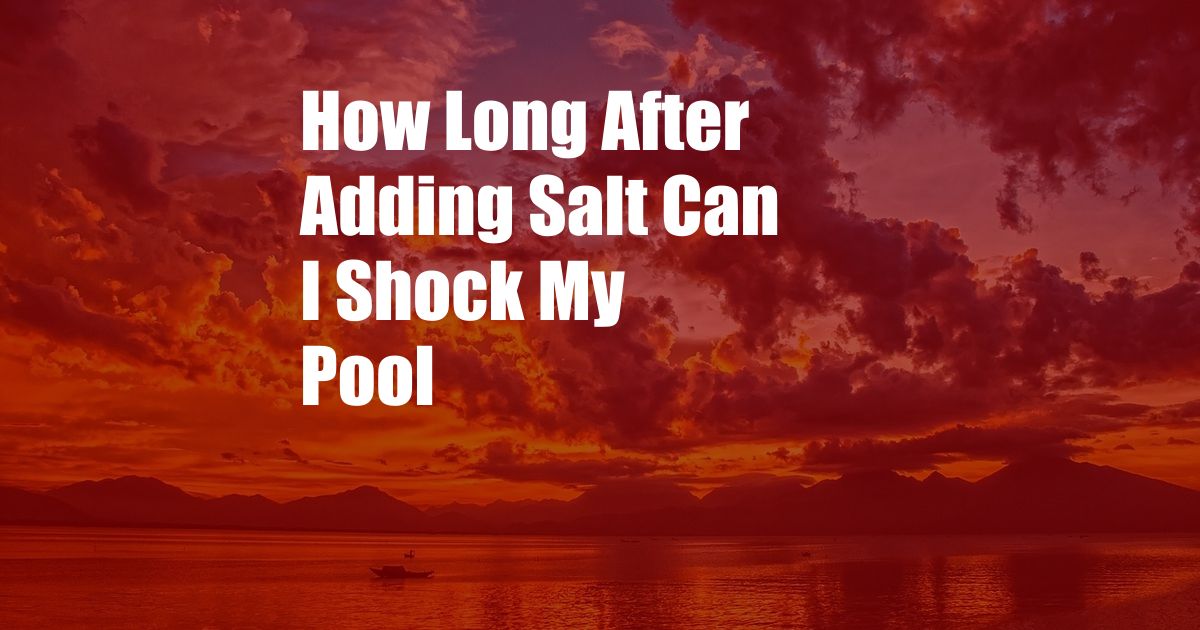
<h2>How Long After Adding Salt Can I Shock My Pool?</h2>
<p>As a pool owner, maintaining the cleanliness and safety of your swimming haven is paramount. One of the essential tasks is shocking your pool, a water treatment method that involves adding a concentrated dose of chlorine to kill bacteria and other contaminants. However, if you recently added salt to your pool to create a saltwater system, you might wonder when it's appropriate to shock it.</p>
<p>The answer lies in understanding the dynamics of salt and chlorine in your pool water. Saltwater chlorine generators produce chlorine by breaking down salt into sodium and hypochlorous acid, which acts as the active sanitizing agent. The process is continuous, meaning chlorine is constantly being produced as long as there's salt in the water.</p>
<h2>Understanding the Timing</h2>
<p>Generally, it's advisable to wait at least 24 hours after adding salt to shock your pool. This allows the salt chlorine generator sufficient time to dissolve the salt and establish a stable chlorine level. Shocking too soon can result in excessive chlorine levels, which can damage pool equipment and irritate swimmers.</p>
<p>However, some experts recommend waiting up to 48 hours before shocking, especially if you've added a significant amount of salt. This extended waiting period ensures that the salt is thoroughly dissolved and evenly distributed throughout the pool water, maximizing the effectiveness of the shock treatment.</p>
<h2>Comprehensive Guide to Pool Shocking</h2>
<p>To effectively shock your pool after adding salt, follow these steps:</p>
<ol>
<li><strong>Test the chlorine level:</strong> Before shocking, test your pool water to determine the current chlorine concentration. Aim for a reading between 1 and 3 parts per million (ppm).</li>
<li><strong>Calculate the shock dosage:</strong> The required shock dosage depends on the size of your pool and the chlorine concentration. Refer to the shock product instructions for specific guidelines.</li>
<li><strong>Broadcast the shock:</strong> Distribute the shock evenly around the pool, ensuring it reaches all areas. Never pour shock directly into the skimmer or on the pool liner.</li>
<li><strong>Run the pump:</strong> Keep the pool pump running for at least 24 hours after shocking to circulate the water and distribute the chlorine throughout.</li>
<li><strong>Monitor the chlorine level:</strong> Regularly test the chlorine level after shocking to ensure it remains within the desired range. Adjust the shock dosage accordingly if necessary.</li>
</ol>
<h2>Latest Trends and Developments</h2>
<p>The swimming pool industry constantly evolves, and salt chlorine generators are becoming increasingly popular. Here are some recent trends and developments related to pool shocking with salt:</p>
<ul>
<li><strong>Automated salt chlorine generators:</strong> Advanced salt chlorine generators can automatically monitor the salt and chlorine levels in your pool, adjusting the production as needed.</li>
<li><strong>Hybrid chlorine systems:</strong> Some pool owners are adopting hybrid systems that combine salt chlorine generators with traditional chlorine tablets or liquid chlorine, providing a more consistent sanitizing regimen.</li>
<li><strong>Ozone and UV systems:</strong> Ozone and ultraviolet (UV) systems are gaining traction as complementary water treatment methods that can enhance sanitizing effectiveness.</li>
</ul>
<h2>Tips and Expert Advice</h2>
<p>To ensure the safety and effectiveness of pool shocking, consider these tips from experienced pool professionals:</p>
<ul>
<li><strong>Use a quality shock product:</strong> Invest in a reputable shock product designed specifically for saltwater pools.</li>
<li><strong>Shock regularly:</strong> Establish a regular shocking schedule, typically weekly or bi-weekly, to maintain optimal water quality.</li>
<li><strong>Avoid overdosing:</strong> Excessive chlorine levels can damage pool equipment and irritate swimmers. Always follow the manufacturer's instructions for the recommended dosage.</li>
<li><strong>Keep swimmers out of the water:</strong> During and immediately after shocking, keep swimmers out of the pool until the chlorine levels stabilize.</li>
</ul>
<p>By following these best practices and seeking advice from pool experts, you can confidently shock your saltwater pool and maintain a clean, inviting swimming environment.</p>
<h2>FAQs on Pool Shocking After Adding Salt</h2>
<dl>
<dt>Q: Why is it important to wait after adding salt to shock my pool?</dt>
<dd>A: Waiting allows the salt chlorine generator to dissolve the salt and establish a stable chlorine level, ensuring the effectiveness of the shock treatment.</dd>
<dt>Q: How long should I wait after adding salt to shock my pool?</dt>
<dd>A: Most experts recommend waiting at least 24 hours, but some may prefer a longer waiting period of up to 48 hours.</dd>
<dt>Q: Can I shock my pool too soon after adding salt?</dt>
<dd>A: Yes, shocking too soon can lead to excessive chlorine levels, which can damage pool equipment and irritate swimmers.</dd>
<dt>Q: How often should I shock my saltwater pool?</dt>
<dd>A: Typically, weekly or bi-weekly shocking is sufficient to maintain optimal water quality.</dd>
<dt>Q: What happens if I shock my pool while swimmers are in the water?</dt>
<dd>A: Excessive chlorine levels can irritate swimmers' skin and eyes. Always keep swimmers out of the water during and immediately after shocking.</dd>
</dl>
<h2>Conclusion</h2>
<p>Understanding the proper timing and techniques for shocking your saltwater pool is crucial for maintaining its cleanliness and safety. By following the guidelines outlined in this article, you can ensure your pool remains a refreshing and healthy oasis.</p>
<p>Are you interested in learning more about salt chlorine generators and pool shocking? Explore our website for additional resources and insights. Dive in and discover the secrets to pristine pool water that will keep you and your loved ones swimming with confidence.</p>
